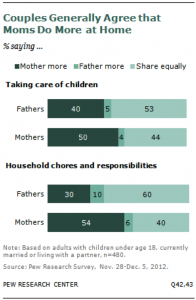Yet again the media is alive with speculation about why men in positions of power cheat on their spouses, often at great risk to their careers—indeed, greater risk than men a generation or two ago when cheating seldom became the scandal it does today. Why is this so, given the fact that we’re further than ever from having clear public norms around acceptable sexual behavior? Indeed, it’s odd that the more marriage becomes de-institutionalized in America, the more publicly problematic extramarital dalliances have become. It would seem to be exactly the opposite of what one would expect.
A colleague and friend asserted that one key reason for the rise in sex scandals is because talking about sex has become easier, and hence more public. For sure. (This blog would be technologically and socially impossible 50 years ago.) When a Kennedy or Eisenhower bent the far-clearer rules around marriage, they did so in an era that did not speak of sexuality publicly without trepidation. Their dalliances weren’t winked at. They were just not thought to be publicly discussable. In this way, it’s a little bit like the problem I noted in a previous blog, about when Joe Paterno came under fire. He was a member of a generation that didn’t like to talk about sex, of any sort. And young adults today—indeed, pretty much anyone under 60—just plain don’t understand that.
But on to Petraeus. While journalists and experts will rack their brain for some new explanation of why men in power take risks that women in power do not, I think it’s a n0-brainer. It points out very old, very stable notions about the sexual exchange itself. Men are the demand side, and women are the supply side. Women could demand sex (and some do), but they’re apt to be remarkably successful when they do. Men can only hope for sex.
David Petraeus didn’t cheat because Ms. Broadwell was so stunningly beautiful that he couldn’t resist her advances. (I don’t frankly know whose idea the affair was.) Certainly this is true of Arnold Schwarzeneggar’s mistress. It’s not about beauty. It’s about sexual availability and men’s excess sexual desire. My favorite social psychologist, Roy Baumeister, one of the few realists writing in a domain—the study of sexual behavior—dominated by idealists, observes:
A man in love may feel sexual desire for a specific, particular woman, but most men also have plenty of free-floating sexual interest in other women, all women, any woman, at least in the broad set of “reasonably attractive” ones (e.g., the top 90% of women in their twenties, etc.).
This is the elephant in the corner that is inexplicably unacknowledged. Most men who stray do so because they like sex. Perhaps “like” is not a powerful enough word to describe it.
Women don’t work the same way. I’m so tired of hearing from people that they do. But it’s just not true. Men are far less discriminating then women.
Baumeister continues:
Before we condemn men as hopeless sinners, however—and I suspect many men regard themselves as such, at least when they reflect on their attempts to come to terms with the inner sexual beast—we might feel a moment of sympathy for their unrewarded successes….He doesn’t get any credit for all the times he stifles his desires, despite all the struggle and sacrifice that they cost him. Daily he wrestles with the beast, and mostly he keeps it controlled….Mostly he succeeds in restraining himself. Out of every thousand times he has to deny himself and stop himself from acting on his feelings, once or twice he slips up, and these can be enough to shame him….(indeed) could ruin him, costing him his career, his marriage, his happiness, even his freedom.
Interesting perspective—one not often noted. Ah, realism. No, male self-control has not changed a great deal over human history. What has grown dramatically is sexual opportunity and what has declined precipitously is social restraint.
At bottom, sex scandals involve men because men want sex more than women do. If the classic sex-for-resources exchange model works—and I hold that it still does, despite the fact that men offer less (and women need fewer) resources than in the past—then women with significant authority and power should rarely find themselves in sex scandals. Why? Because they don’t need the resources. They already have them. The scandals will almost always be about men, because while they’ve got more than enough resources, it’s the sex that remains elusive, just out of reach. Until it’s not.
















